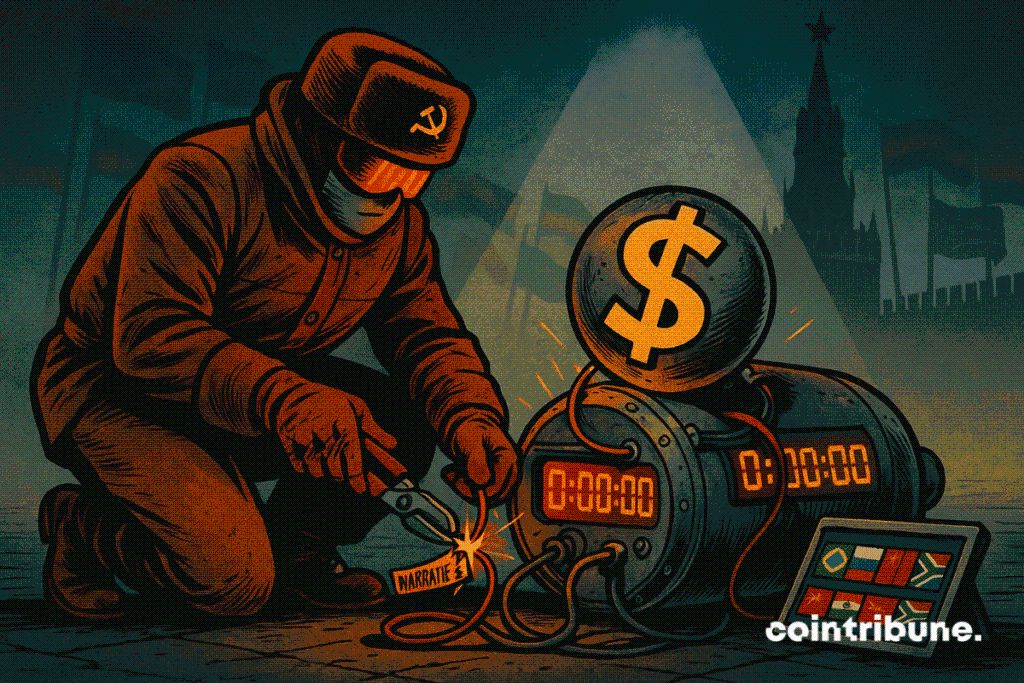Trump’s Accusations : Are BRICS Trying To Overturn The Global Financial Order ?
The dollar, the cornerstone of the global financial system, once again finds itself at the heart of a geopolitical controversy. Donald Trump accuses the BRICS of wanting to undermine its supremacy. In response, the Kremlin firmly denies any intention of destabilization, stating that the alliance does not target any foreign currency. Behind this tense exchange, one question remains: are the BRICS quietly working to reshape the global monetary order, or is this an alarmist reading of the ambitions of this emerging bloc?

In brief
- Donald Trump accuses the BRICS of wanting to weaken the supremacy of the US dollar.
- The Kremlin firmly rejects these accusations, stating that the BRICS do not target any currency.
- Spokesperson Dmitry Peskov reminds that the bloc only aims for economic cooperation among its members.
- Despite this denial, some members, like China, are leading initiatives to reduce their dependence on the dollar.
A group for cooperation, not confrontation
While BRICS Pay quietly advances to bypass the dollar and challenge SWIFT , the Kremlin reacted firmly on October 15 to Donald Trump’s accusations, who had called the BRICS a “threat to the dollar” and mentioned the possibility of imposing economic sanctions on their members.
The response from Dmitry Peskov, spokesperson for the Kremlin, was direct and unequivocal :
- Peskov stated that the BRICS “have never sought to attack other countries or their currencies”, thus rejecting any desire to destabilize the global economy ;
- He emphasized that the BRICS are a unified group around values of cooperation and mutual prosperity, and not an alliance directed against the United States or their allies ;
- The Kremlin insisted that Russia and other BRICS members are by no means seeking to compete with the supremacy of the dollar, but to strengthen their internal economic relations.
This statement aimed to ease tensions and redefine the intentions of the BRICS group in a context where relations with the United States remain tense. The Kremlin emphasizes the collective dimension of the group, which, according to it, is not motivated by monetary rivalries or large-scale geopolitical ambitions, but by a desire for regional and international economic cooperation.
The BRICS and the rise of the Yuan
Despite Russian denials, there are internal dynamics in the group that go beyond political statements. While Russia emphasizes unity and cooperation, China, as the economic leader of this bloc, pursues a strategy of monetary diversification.
The Chinese government is actively working to promote the use of the yuan in international trade, notably through bilateral agreements and initiatives such as the “currency swap agreements between central banks”. This indicates a desire to reduce dependence on the dollar in certain regions of the world, without directly aiming for immediate substitution.
This approach, although it does not directly challenge the dollar’s dominance, reflects a growing interest of the BRICS, especially China, in the internationalization of the yuan. China’s recent project to create a yuan free trade zone in Asia and Africa could be seen as a sign of a gradual evolution of the international financial system.
However, obstacles remain numerous : the volatility of the yuan, the reluctance of some countries to adopt a currency controlled by China, and the clear resistance of the United States to losing their leadership position in global trade.
Although the Kremlin strives to calm spirits by rejecting Trump’s accusations, it is undeniable that the BRICS, notably China, are developing monetary strategies that could in the long term alter the global financial architecture. Future developments will depend on these countries’ ability to overcome economic and political challenges while maintaining their cooperation within the group. The stakes are colossal, and the dollar’s dominance could eventually be questioned.
Disclaimer: The content of this article solely reflects the author's opinion and does not represent the platform in any capacity. This article is not intended to serve as a reference for making investment decisions.
You may also like
The Biggest Bitcoin and Crypto Treasury Plays of 2025
Why Can’t Bitcoin Experience Massive Rallies Anymore? Anthony Pompliano Says the “Wild Era” Is Over and Explains Why
Bitcoin Stalls Below $90K as Traders Eye $86K Support, Says Michaël van de Poppe
Amazon’s AI assistant Alexa+ now works with Angi, Expedia, Square, and Yelp

